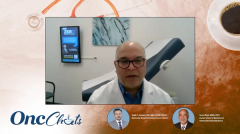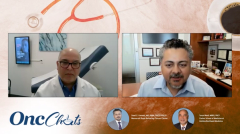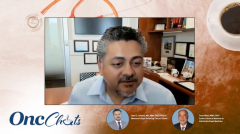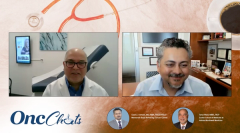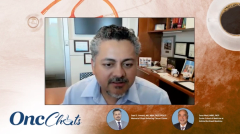
Optimizing the Use of Bispecific Antibodies in Myeloma and Beyond: Management Strategies
In this episode of OncChats: Optimizing the Use of Bispecific Antibodies in Myeloma and Beyond, experts emphasize the need for comprehensive patient education, effective communication, and specific safety protocols to manage patients receiving bispecific T-cell engagers.
Episodes in this series

In this episode of OncChats: Optimizing the Use of Bispecific Antibodies in Myeloma and Beyond, Saad Z. Usmani, MD, MBA, FACP, FASCO, of Memorial Sloan Kettering Cancer Center, and Tarun Wasil, MBBS, FACP, of Northwell Medicine, emphasize the need for comprehensive patient education, effective communication, and specific safety protocols to manage patients receiving bispecific T-cell engagers.
Wasil: [Management] requires education of the patient, their family members, and the physician teams—not only in the community center but also in the hospital setting, as you said. Patients should be provided with a diary, with the blood pressure monitoring machine and pulse oximeter preferably, because they need to know when to call. They also should be provided with some specific [phone] numbers—not the general numbers for the services of various hospitals and centers—because there could be delays in getting help for those patients. In our practice, we do provide cell phone numbers to our patients [although] I understand that this is not possible for every physician. We also do some video calls on the weekdays. We can do video calls every couple of hours to make sure that patients are safe.
We have some study protocols now for myeloma as well as lymphoma, where we are starting some of these bispecific T-cell engagers [in the] outpatient [setting] and making sure that patients do well. In order to ascertain that, I think we need to educate a number of teams, as well as patients and their family members. If the patient is unable to really participate in this type of engagement, I think they must be admitted—especially the elderly patients—because safety is of the utmost concern, and we want to make sure that the patients stay safe.
Usmani: I completely agree with you. In our setup, we have a phone number that patients can call specifically for the bispecific therapies, and we actually have an outpatient physician beeper so that we can receive those calls and triage the patients. I think having that kind of a mechanism, especially as we get more patients who are receiving bispecific agents, is something that can be employed by community colleagues, as well—especially with a large group like yours, Tarun. I think that’s something that can be a shared responsibility.
Wasil: Yeah, I think that’s important, and also giving them a dose of dexamethasone to keep at home. In case they actually have a fever and a slight decrease in blood pressure, they can at least take the dexamethasone while they are waiting for other help to arrive, or while they are on their way to the hospital. [In this way,] they can start treatment to some extent.
I was talking to one of our practices in Tennessee, and they have some protocols. It seems like they have treated more than a few dozen patients [in the] outpatient [setting], and they give dexamethasone for a 3-day period in a [twice-daily] dosing, and aggressive hydration, which can help some of these patients avoid the hospitalizations to some extent.
The other thing that we tried in a prior practice setting is doing the ramp-up dosing on a weekday, starting with Monday rather than on a Friday, because the weekend is always tricky. If the patients get sick, it is sometimes very hard for them to get help on a weekend. So those are some of the things that I think about when I start a patient on any bispecific on a protocol.
Usmani: That's absolutely appropriate.


